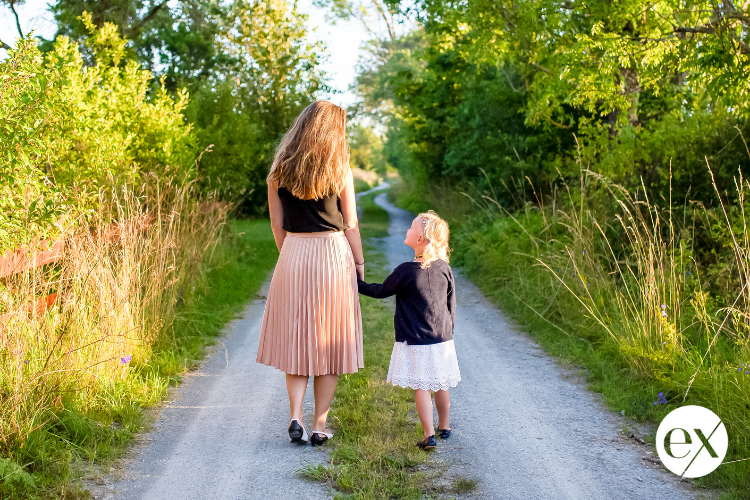
T.H. & Jess share their tips on parenting (as well as during divorce)
Whether your children are really little (like two and four) or even in their late teens, as a parent you always feel obligated to be the best version of yourself – especially going through this divorce process. No what-ifs, and, or buts…but we have to be okay not knowing where to start. Jess and T.H. dealt with all of this and have tips to share that helped them navigate through divorce – from knowing when is a good time to keep quiet to when it’s necessary to be an open book.
TIP #1: SHHHHH! AND LISTEN
A bad listener is someone who is already preparing what they’re going to say without actually hearing you first. And who wants that? Children want the same attention you do when you have to get something off your chest, so why don’t you just zip it up and open your ears.
When T.H.’s son was four years old, she didn’t really take into consideration that maybe he had anxiety and depression. I mean, it’s hard to recognize something like this at such a young age. But after her separation from her husband, she found that the best way to let her child feel heard was to stop trying to be the fixer. “Don’t be preparing a response that may not have anything to do with what they’re actually upset about, by the way, because if your mind is already racing, you’re like, do you want water? Do you want to go for a walk? Do you want a candy? Shut the fuck up, that’s my best advice for if your kids are upset and struggling with anything really.”
TIP #2: YOUR KIDS ARE LISTENING, TOO
When it comes to kids and divorce, there are no secrets. Children notice things a lot quicker than you think which is why Jess emphasizes the importance of having conversations with them. Of course, they don’t have to know every detail because this can backfire on you (I’ll explain later on), but as any parent knows, some conversations are more age-appropriate than others.
No matter how young your children are, Jess says they will always be curious, “They’re going to start asking pretty quickly, but why are you getting divorced? Why are you and daddy getting divorced? Why are you and mommy getting divorced?”
Jessica’s son was four at the time she and her first husband split up, and as young as he was, he started getting the idea that something was up with mommy and daddy. As he grew older, he began asking why they got divorced. For a number of years, she usually responded by simply saying she and her ex-husband were just better off as friends. Once Jake started using the side-eye with his father, Jessica knew it was a wrap. In the very beginning, when they were toddlers, she didn’t feel it was necessary to tell them that their father had cheated; and for some people, those kinds of conversations might be something you want to discuss with your partner.
But don’t kid yourself, the questions are going to keep coming in, so it’s good to have some sort of plan. Jessica says that “both of you have to understand that the conversation is going to continue. It’s going to evolve and change over time as your kids are more mature and recognize that they don’t have the whole truth.”
Not only do you have to have backup plans, but you have to move in secrecy, especially if you don’t want the word out, just yet. Your children are always listening so before you start the shit-talking, take a double look around you, “anything bad you have to say about your ex, you’ve got to save it for private time because it makes you look ugly.” I know you don’t want to look like the bad guy, but your children are like little messengers. Even if you think they won’t mention anything to your mother-in-law, they probably will. And it’s not their fault, they just say what they say. Also, you have to know that despite how smooth you try to be about it, kids know when you’re trying to fish for information. Especially when it comes to trying to find things out about your ex and/or the in-laws. Control yourself, because if you end up being in a difficult custody battle, it can actually hurt you in terms of valuations and parenting time.
TIP #3: DO YOU REALLY WANT YOUR CHILD KNOWING EVERYTHING?
When going through a divorce, especially when transitioning to becoming a single parent, a lot of people will try and make their kids their best friends. When this happens, the child can become the adult and the caregiver, since the parent is sort of allowing these roles to fall apart. T.H. agrees that this can be a problem, as it disrupts their childhood and actually feeling like one. “Don’t rely on your child. It will be damaging in the future and they might resent you…let them enjoy as much of their childhood and their normal life outside of the divorce and separation that they can.”
Now you may feel a lot of pressure about having to answer questions the kids ask, but sometimes it’s okay to give authority to your ex-partner in answering some of these curious questions. Like, what if you don’t have an answer? What if your child asks you specifically about the divorce right now? In T.H.’s case, since her husband cheated, when the kids asked about the situation, she would redirect the conversation by stating, “I suggest asking your father, or I think your dad knows better, why don’t you ask him?”
Her eight-year-old daughter at the time was the one addressing the issue, pushing the questions. Obviously, it made him uncomfortable but that’s his story and in some cases like T.H.’s, it might be better that the kid’s dad explained what happened.
TIP #4: THERE IS NO “RIGHT” TIME FOR YOUR CHILDREN TO MEET SOMEONE NEW
When you do start to date again, everyone goes at their own pace. Maybe your partner decided to introduce a new significant other way before the official divorce? Or maybe you decided to wait a couple of years before getting your foot in the door? Either way, there is no set rule for when you should start bringing your new partner into the picture.
Jessica explains that when her children were under the age of five, they had already met the woman that their father was seeing. By middle school, her ex had introduced so many women to their children that she was slightly disappointed. Once again, although there is no set rule, Jessica moved at a more cautious pace.
She wanted to make sure the next guy was going to be an asset to both her life and her children. Even if they’re the nicest person in the world – feeds the homeless every weekend, treats you the best you have ever been treated – every child responds differently. They might not be ready to meet the new person that you like, or they could have possibly been hoping that you and their other parent were getting back together. You must tread lightly, “when you introduce your kids to someone new, it has to be based on whether or not you think that there is any potential longevity with that partner and whether or not you think your kids are emotionally in a place where they’re going to be able to actually accept that new partner.”
TIP #5: LOVE YOUR KIDS MORE THAN YOU HATE YOUR EX
You guys are still a team in many ways, no matter whatever the reason was that you got divorced. Whatever negative feelings you have towards your ex, hopefully, they aren’t as strong as the love that you have for your children. Remember, it’s not ideal for kids to grow up in a home where they don’t have a relationship with their mother or father. Regardless of the circumstances, the bond remains between you and your partner; your children will only benefit if you put co-parenting first.
Your ex is going to be in your life forever, on every occasion. Why be the one who’s the reason your child doesn’t want to go to Grandma’s for holidays? Jessica explains that the most important role in the separation process is being able to handle the division, “You have just as much right to be at those kids’ birthday parties, at their sweet 16, at their graduations, at their wedding, at the birth of their children, at all of the important events for the rest of your lives. You don’t want to have to be the one that’s going to ruin it.”
As they grow older, you wouldn’t want your daughter resenting the fact that her father is going to be walking her down the aisle. Whatever is going on, the divorce isn’t the most important thing – the most important is providing an example of what loving relationships look like. As a parent, it’s your job to say what the schedule is when co-parenting and sticking to it, which actually makes your life easier. Even if kids say they don’t want to go to the other parent’s home for “their” time, it’s important to do your best to stick to the schedule. This shows both your kids and your ex that there is a level of respect for what you agreed upon, and it also shows your children that you believe their time with the other parents is valuable. And keep in mind, you would want that same level of respect back from your ex, so treat them as you want to be treated. It’s a lesson your kids will see and never forget.
Leave a Comment
You must be logged in to post a comment.










